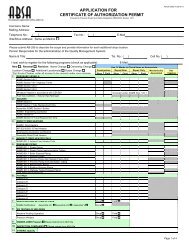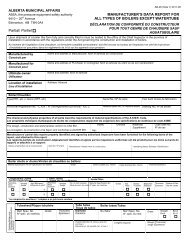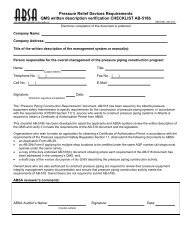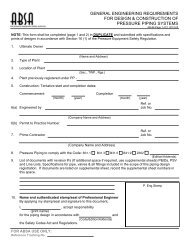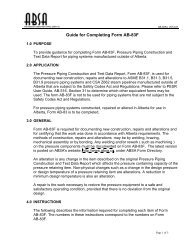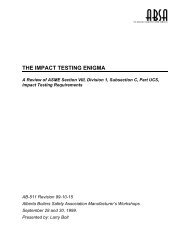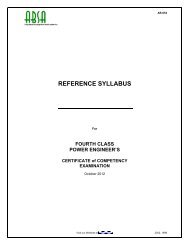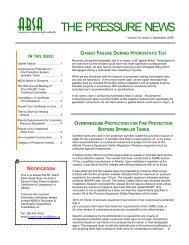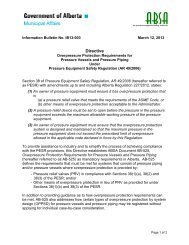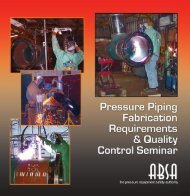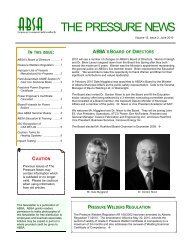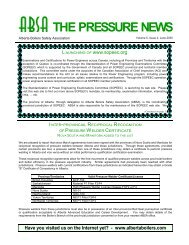The Baker Panel Report - ABSA
The Baker Panel Report - ABSA
The Baker Panel Report - ABSA
Create successful ePaper yourself
Turn your PDF publications into a flip-book with our unique Google optimized e-Paper software.
Moreover, the new 2006 integrity management standard indicates in Element 2 that staff with assigned integrity management responsibilitiesmust have defined roles and must be competent to carry out integrity management related tasks. <strong>The</strong> standard also provides that each BPoperation, including each U.S. refinery, must have in place, among other things, job descriptions that define the responsibilities and activities of integrity management-related jobs, together with the requiredattributes, competencies, qualifications, experience, training, and certification (required by applicable regulators); systems that quantitatively assess and record integrity management-related competencies; and a training and development process designed to bring integrity management-related staff up to the required level of competence fortheir role, along with refresher training.> Executive management, line management above the refinery level, and refinery plant managersDuring its review, the <strong>Panel</strong> attempted to determine the extent to which BP defined the process safety knowledge and capabilities required fordifferent participants in BP’s process safety system. Information and data available to the <strong>Panel</strong> indicates that BP had not effectively definedthe level of such knowledge or competency required of executive management, line management above the refinery level, or refinery managers.Executive management and line management above the refinery level. As discussed in Section VI.A, the information that the <strong>Panel</strong>obtained, including information from interviews with executive and corporate management, indicates that the executive management did notfocus on process safety performance to the same extent as personal safety prior to the Texas City accident. <strong>The</strong>se interviews indicate thatconversations about safety at the executive level and at the corporate level are different now than they were prior to the Texas City incident andthat post-Texas City, BP executive management has an increased awareness of and appreciation for process safety. <strong>The</strong> inclusion of someprocess safety performance indicators in the new 2006 integrity management standard and in the enduring milestones that BP is now trackingindicate this increased awareness. Having an appreciation of process safety at the executive level is particularly important for BP, with itssystem of cascading performance contracts, because the Chief Executive, Refining and Marketing plays a primary role in establishing theperformance metrics for refining line management that drive performance and behavior in BP’s U.S. refineries. For additional discussion ofprocess safety performance metrics that BP uses, see Section VI.C. For additional discussion of BP’s reliance on performance contracts, seeSection VI.A.As discussed in greater detail in Sections VI.A and VI.C, executive management focused primarily on personal injury rates rather than processsafety performance. Admittedly, even for personal safety this focus involved reviewing aggregated information about injury rates such as daysaway from work frequency and recordable injury frequencies rather than information on a business unit or site-specific basis. Little operationalinformation regarding process safety performance was reported regularly to executive management, other than the reporting of major incidentsand high potential incidents. It appears that executive management did not monitor or have awareness around process safety managementinformation on a basis comparable to personal safety. <strong>The</strong> <strong>Panel</strong> is not suggesting that executive management should be subject matterexperts on process safety management in BP’s U.S. refineries. On the other hand, some base level of process safety awareness and knowledge isrequired in order for executive management to monitor process safety performance effectively and to establish appropriate process safetyperformance metrics from time to time. Under the BP Management Framework, executive management delegates authorities and responsibilitiesto subordinate managers and establishes performance contract metrics that then cascade throughout the business organization.Some knowledge of process safety, or expertise from technical staff, is required for establishment of appropriate performance metrics,including what performance expectations need to be addressed and in what degree of operational specificity; the qualitative or quantitativecriteria that should be used to define levels of process risks that will or will not be tolerated; and the standards that will be used to determinewhether process safety performance is acceptable at the Group level.Similarly, BP does not effectively define the level of process safety knowledge or competency required of line management above the refinerylevel. <strong>The</strong> <strong>Panel</strong> does not doubt that the current position holders, because of their prior refining operations experience, have an adequate level ofprocess safety knowledge and competency. In order to ensure, however, an adequate level of process safety knowledge and competency for suchProcess Safety Management Systems C 151



